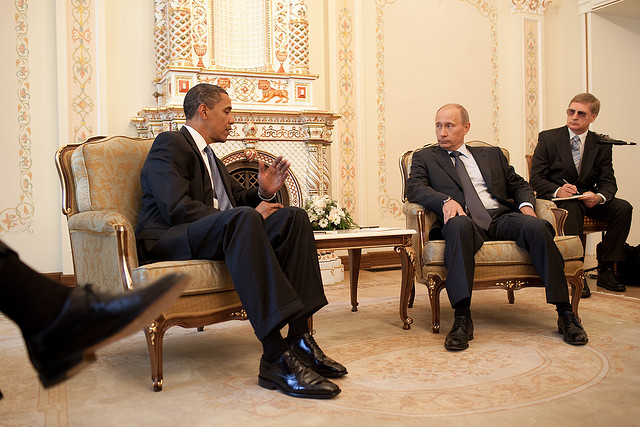News reports that Moscow has almost certainly violated the INF Treaty governing intermediate-range nuclear missiles should come as no surprise to anyone with even a cursory knowledge of the subject. Russia has cheated on practically every single arms control treaty with the U.S., with the possible exception of the New START Treaty, which has not yet been fully implemented.
The latest violations have been thoroughly documented, most notably by Dr. Mark Schneider at the National Institute for Public Policy. Yet State Department spokeswoman Jen Psaki told the New York Times that the matter is still under review. State’s “ongoing review process” is doubtless intended to buy time while the department figures out what — if anything — it intends to do about the cheating.
Sen. James Risch (R-Idaho) recalls that “[w]hen Secretary Kerry was chairman of the Senate Foreign Relations Committee, he expressed grave concerns regarding Russian cheating and urged in the strongest terms that there needs to be real consequences for cheating.” One would think that, since John Kerry is now secretary of State, there would be serious consequences in store for Russia. Thus far, though, there has been nary a peep from his office, just as there was none when Hillary Clinton held the post.
Indeed, despite Kerry’s concerns over Russia’s proclivity to flout treaty agreements, President Obama announced his intent to pursue further nuclear reductions with Russia just months after the former Massachusetts senator was sworn in to the top job at State. Evidently the administration does not believe treaty compliance is a necessary requirement for treaty effectiveness. This does not instill confidence in those already skeptical of the recently negotiated Iranian nuclear deal.
It gets worse.
Remember that embarrassing open-mic moment in 2012 when President Obama was caught asking Dmitri Medvedev for more “space” until after the election, when he (Obama) would have “more flexibility” in negotiating with Moscow on missile defense? Moscow continues to oppose work on missile defense systems for the U.S. and its allies, while retaining the right to keep American cities at risk of nuclear annihilation (of course).
To be clear, President Obama was caught asking the Russian president to give him space regarding the deployment of defensive systems so that the two countries could work together on other agreements. And this request came even though Mr. Obama and his State Department understood Russia to be cheating on treaty obligations.
This brings us to a few obvious conclusions. First, the United States should not shrink its nuclear force below New START levels. Indeed, it should not even implement the New START Treaty until Russia is in full compliance with its treaty obligations.
Second, the Senate ratified the New START Treaty in exchange for the administration’s commitment to modernize the American nuclear complex and strategic delivery systems. That hasn’t happened. More than three years after ratification, the U.S. remains the only nuclear power without an active nuclear modernization program.
Lastly, there’s the matter of missile defense. To allay concerns about the New START Treaty, the president gave the Senate a written assurance that the U.S. would deploy all four phases of its missile defense plan, regardless of Russian objections. Thirty months later, in March 2013, Secretary of Defense Chuck Hagel announced the U.S. would cancel the last phase of the plan.
The Russians immediately renewed their objections to the other phases of the plan. Though the administration insists its commitment to the remaining elements of the plan is “iron-clad,” some policy-makers and U.S. allies are understandably skeptical. Any sort of “strategic pause” or delay while lauding the “adaptability” of the system should be interpreted as an outright abandonment.
The Obama administration has demonstrated a pattern for negotiating agreements that have resulted in great strategic loss for the United States. And so having won reelection, President Obama now has the “space” and “flexibility” he wanted. What’s needed now is accountability — for this administration and the Russians.
